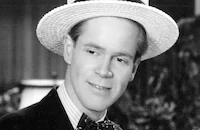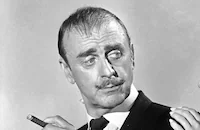Al Jennings of Oklahoma
Brief Synopsis
Cast & Crew
Ray Nazarro
Dan Duryea
Gale Storm
Dick Foran
Gloria Henry
Guinn "big Boy" Williams
Film Details
Technical Specs

Synopsis
In 1863, in Tennessee, as the battle between the States rages, the wife of Confederate officer Major Jennings gives birth to her fourth son Al in a small abandoned cabin. Mirroring the turbulent times in which he was born, Al grows up quick-tempered and prone to violence in Coldwater, Kansas. Although he follows his older brothers and father into the respectable practice of law, Al is not beyond provoking a brawl in open court when angered. Eventually, with Judge Jennings' consent, Al and his brother Frank decide to leave Coldwater and join their brothers John and Ed in Woodward, in the Oklahoma Territory. On the journey, Al comes to the aid of Margo St. Claire when she is trapped on a runaway buckboard. Margo tells Al she is also traveling to Woodward for a brief visit with her uncle, Bob Kyle. Upon arriving in the town, Al and Frank discover that Ed is in the middle of a water rights case, defending Kyle from accusations of non-payment by known swindler Bill Mertz. The next day in court, Al runs into Margo and flirts with her. Although charmed, she tells him she is returning home to New Orleans shortly and Al promises to visit her there. Later, Al interrupts the court proceedings when the opposing counsel, Tom Marsden, maligns Ed. A fight breaks out, but once Al is subdued, Ed eventually wins his case, incensing Mertz and Marsden. The next evening Mertz sees Ed and Al in the local saloon playing cards and summons Marsden, who confronts and kills Ed. The sheriff promptly arrests Marsden and assures a furious Al that justice will prevail in court. The next day, as Judge Jennings joins his grieving sons, the sheriff regretfully informs them that Marsden is out on bail. Angry, Al rides out to Marsden's ranch, determined to get a signed confession from him. Marsden stalls, then draws his gun, but Al is quicker. Mertz, witnessing the killing, hurries away to report to the sheriff, blaming Al. Al flees with Frank and together they outwit a posse before riding into the Diamond B cattle ranch, which they soon discover is a cover for outlaw Fred Salter and his gang. Salter blackmails Al and Frank into joining the gang, threatening to turn Al in for the posted $1,000 bounty. Al quickly becomes the head of the gang, which holds up banks, stagecoaches and trains. When the bounty on Al goes up to $20,000, the brothers decide they should break away from Salter and escape to Louisiana. Under the name of Thompson, the Jennings use their abundant means to begin a cotton brokerage and go straight. Al looks up Margo and confesses his past, which she forgives, and soon the couple is engaged. One day a railroad detective, Dan Hanes, recognizes the Jenningses and plots to have them kidnapped and taken back to Oklahoma Territory. With Margo's help, however, Al and Frank escape. Knowing they can not stay in Louisiana, they return to Salter's ranch to pull one final job to get enough money to leave the country. Mrs. Salter, greedy for the reward money, informs the marshal about the robbery plans. A posse captures all the gang except the Jenningses, who cross the state line into Arkansas before Al is thrown from his horse, breaking his leg. The marshal disregards the state line and arrests the brothers. Back in Oklahoma, Judge Jennings defends his sons in court but the trial judge bullies the split jury into convicting the Jenningses. Frank is sentenced to five years and Al to life. Five years later, however, the irregularities of Al's arrest and trial gain him release and eventually a pardon from President Theodore Roosevelt.

Director
Ray Nazarro
Cast

Dan Duryea
Gale Storm

Dick Foran

Gloria Henry

Guinn "big Boy" Williams
Raymond Greenleaf
Stanley Andrews

John Ridgely

James Millican
Harry Shannon
Robert Bice
Helen Brown
George J. Lewis
Jimmie Dodd
Edwin Parker

James Griffith
William "bill" Phillips

John Dehner
Charles Meredith
William Norton Bailey

Louis Jean Heydt

Harry Cording
Theresa Harris
Mary Alan Hokanson
Myron Healey
Kernan Cripps
Charles Marsh
George Lloyd
Hank Patterson
George Chesebro
Libby Taylor
Mildred Boyd
Ann Codee
Earl Hodgins
John R. Hamilton
Harry Tyler
Tommy Ivo
Rudy Lee
Jimmy Bates
Guy Beach
Leroy Johnson
Boyd Stockman
George Bell
Slim Gaut
Crew
Mischa Bakaleinikoff
George Bricker
Francis Cugat
Louis Diage
Richard Fantl
Rudolph C. Flothow
Jack Goodrich
Victor Greene
W. Howard Greene
Gilbert Kay

Film Details
Technical Specs

Quotes
The men look bad to me.- Mrs. Salter
Well, they ought to feel right at home around here.- Fred Salter
You fellas bound for Woodward?- Lon Tuttle
Yeah. We thought maybe you could tell us something about the town.- Al Jennings
You sure stopped the right party, son. I know all about Woodward. It's a rip-roaring town if there ever was one. Growing like a weed and wide open. Oh, but the prices there... it costs a fortune for anything you buy. So I hope you boys brought plenty of money along with ya.- Lon Tuttle
Oh, we brought enough.- Frank Jennings
Well, in that case just step right down off them horses and hit the ground with your hands in the air!- Lon Tuttle
There's an old saying about juries - the longer they're out, the better your chances.- Al Jennings
Any of the old bunch still around?- Frank Jennings
Not many. Fred Salter is in jail for cattle rustling. Sammy Page and Doc Wrightmire got themselves hung for horse stealing. And the last I heard of Pete Kincaid, he was down in Indian country for his health. He got a sudden attack of lead poisoning running away from a posse. That leaves me and Buck and Slim Harris.- Lon Tuttle
Things must be pretty quiet around here.- Frank Jennings
Train robbers!- Alice Calhoun
That's right, miss.- Detective Dan Hanes
Oh, my goodness gracious! I simply don't know whether to chilled or thrilled!- Alice Calhoun
Trivia
Notes
The film opens with voice-over narration establishing the setting. The narration continues intermittently throughout the film, detailing specifics of Al Jenning's life over a montage of the events. The real Al Jennings (1864-1961) ran away from home at the age of eight and, according to a January 1954 news item in Los Angeles Daily News, while Jennings was working as a cowboy, he learned the law by reading Blackstone's Commentaries. The same article indicates that "Margo St. Claire" was a fictitious character, as Jennings met his wife Maude after his release from prison.
Jennings was reportedly not completely satisfied with this filmed version of his life, which showed him robbing stagecoaches when he actually specialized in mail-train heists. According to Hollywood Reporter news items, Burt Kelly was initially slated to produce, but his participation in any phase of production has not been confirmed. Jennings' story was filmed earlier in 1914 as Beating Back by Thanhouser Film Corp., directed by Caryl S. Fleming and starring Al and Frank Jennings. A story by Al Jennings was used for Hands Up!, a 1917 Fine Arts production. In 1918, Al Jennings formed his own production company, which produced the sole film The Lady of the Dugout, directed by W. S. Van Dyke and starring Al and Frank Jennings (see AFI Catalog of Feature Films, 1911-20). Throughout the 1920s and sporadically into the 1930s, Al Jennings appeared in bit parts in westerns and action films, including several of Universal's silent "Blue Streak" Westerns.












